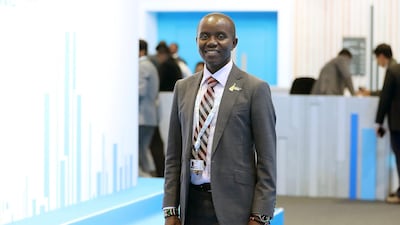Kenya, which is home to almost 25 million people below the age of 19, is aiming to use the latest technology to enhance the country's mobile money network, where people access banking services by phone.
In addition, and in collaboration with the UAE, Kenya hopes to expand its services across the whole of Africa.
"We are working with the UAE Government to find out ways to establish the right machinery in Kenya that will enable us to offer logistic services across the region using technology. A lot of things are going on with the UAE," Joe Mucheru, Kenya's Minister of Information and Communications Technology (ICT), told The National..
“As a country, we are only 50 million but as Africa we are 1.3 billion. Our heads of trade have already signed continental free trade area agreements. In Kenya, our aim is clear ... to go beyond geographical boundaries.
Regarding the development of Kenya's in-country mobile services, Mr Mucheru, speaking in Dubai where he is attending International Telecommunication Union’s conference, said: “We are a young country ... up to half [of the population] are below 19 years. And all these young people are on mobile where most of the technology is residing these days.
“Our aim is to capitalise on this culture and expand the web of mobile money further,” he said, adding, “Currently, over 75 per cent of Kenya’s adult population is using mobile money and this number is much more than the individuals using physical banking services.”
Mobile money technology, which is also referred to as mobile wallet, allows people to receive, store and spend money via a mobile phone.
“In fact, we are transacting the whole GDP of the country through mobile money … It’s around $70 billion annually, so you can imagine the volume of money involved,” said Mr Mucheru.
_______________
Read more:
Quick take: Why is African agribusiness luring GCC investors?
South Africans brace for further pain as recession bites
_______________
The Kenyan ICT ministry is also executing a project to cover the entire population under a national health scheme where a single health card will allow people to use services anywhere in the country. Authorities are collecting biometric data of residents and subsequently health cards carrying that information will be issued. Citizens can access any medical facility across Kenya, using these health cards.
“To start with, we have begun a country-wide roll out of [digital] services and gradually it will be expanded across the region. We are working towards creating single digital market in Africa. There should be a single ID allowing individuals and business to access services [digitally] in entire Africa,” said Mr Mucheru.
“Technology can unify all African nations and we are keeping all politics and any other regional issues out of it.”
Twenty one of the 25 least-connected countries in the world are in Africa and only 22 per cent of the continent's population has access to the internet, according to the World Bank Group, which launched the Digital Economy for Africa (DE4A) initiative in April this year to bring together African finance and ICT ministers, central bank governors, global tech and telecom giants.
Currently, nearly 78 per cent of Kenya’s population is covered under a 3G network and the ICT ministry is planning to cover the entire nation under 4G by next year.
“We are working in partnership with private players like Google and Alphabet to have 100 per cent deployment of 4G network using balloons by the first quarter of 2019. I think Kenya will be the first country to have commercial deployment of balloons for 4G connectivity,” said Mr Mucheru.
To cover remote areas, high-altitude balloons are placed at a height of about 18km and used to create an aerial wireless network.
Harnessing technology, Kenya’s ICT ministry is offering almost 100 government services through its online platform e-citizen service. It considers financial services, technology and business services, agriculture and health as the top four game-changers in Kenya's economic future.
“Right now we are exploring how we can use blockchain and artificial intelligence to offer more citizen-centric services. ICT is just an enabler and we are investing heavily in different sectors,” said Mr Mucheru.
In the past few months, the ICT ministry has invested $700 million to build world-class technology set-up and $170m in developing data centre infrastructure.


